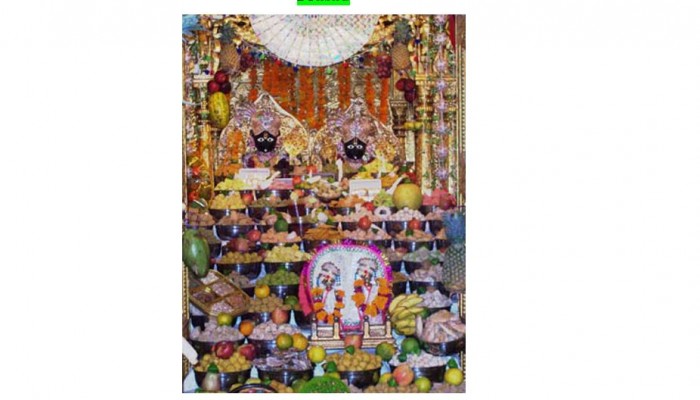The concept of 'Prasad' in Hinduism and why it is intrinsic to Indians
- In History & Culture
- 04:08 AM, Aug 09, 2018
- Richa Yadav
The huge tree in front of our house gave beautiful, bright, yellow, bell shaped, extremely sweet flowers called ‘Mahua’. In the wee hours, we used to witness the spectacular sight of aromatic yellow bedsheet of flowers all over the street. My brothers and I had this unassigned task of picking mahua fruit every morning. We collected mahua, after which our aunt spread it on the terrace and made several sweet dishes with desiccated mahua as the main ingredient. In the entire community, ours was the only house with this exotic tree. As it was the main alley, many passersby had their eyes on ‘our priceless possession’.
Next to our house was a temple. Many devotees, mostly women, used to visit that temple right after their bath, with a vessel of water which they called ‘jal’, as an offering to God. They used to pick mahua on their way and add it to their pot of water. As children, it was such a displeasure to us. But when they smilingly replied, “Beta (child) it’s for Kali mai, (Goddess Kali)’, we disarmingly surrendered. Theft of deep red Hibiscus flowers in the neighborhood was conducted so unabashedly as we believed that it was for our own God! Every morning on ‘Shivratri’ (a day dedicated to God Shiva), I used to go with a bunch of nubile girls; all those ‘early birds’ talked and giggled on the way while they walked briskly. Their goal was simple, to pick ‘bel patra’ (a kind of leaf), ‘Dhatura’, (a poisonous flowering plant), ‘Tulsi’, and white ‘Chameli’ flowers from the vicinity to offer it to Shiva, their ideal matchmaker God.
Making an offering to God is a unique idea of Hindu dharma. The idea is to offer something and then consume it as ‘prasad’ a blessing from God. ‘Prasad’ is a Sanskrit word which means ‘favor or grace’. It is the food and water offered to a deity during worship. For a common Hindu, the offering of food to the gods is as natural as a mother feeding her child. All belongs to Him, the entire universe is created by Him, yet, it’s important to express one’s gratitude to the divine by offering according to one’s affordability and devotion.
It is a very common practice to take something to offer whenever you visit a temple, or your spiritual Guru, not because the God in the temple is waiting to be fed, but because it shows your own readiness to part with your belongings. The essence being, ‘to gain you must give’. And what is there to gain? Well, the highest achievement would be ‘self-realization’. And your first step to achieve the highest goal is to learn to give, to part with your attachments and weaknesses. And how to begin this process of giving? What is that which you can give? Prima facie comes that which is most basic to you, food and water. Every one’s basic level of content is food. So, as a devotee, offer it to God before you eat. Then offer money, then your mind, then finally your heart, as complete surrender is the final goal.
Some Hindu families follow the tradition of offering their first meal to God, and only then they would taste their food. The belief behind the gesture is that after eating what had been offered to God as ‘prasad’, the food we eat becomes charged with His blessings and gives us a very positive effect on body and mind. It is believed that the deity partakes off and then returns the offering, thereby consecrating it. Prasad is all purifying. ‘Prasad’ is the most sacred object for a devotee.
There is also a grand tradition of offering ‘chappan bhog’ or fifty-six food items to God as ‘prasad’! The anecdote behind offering fifty-six items is the gratitude people show to God Krishna who once safeguarded the villagers from a disastrous rain which lasted for seven days. Krishna remain famished, skipping his eight items meal per day, consecutively for seven days as he stood up protecting the villagers from the wrath of rain lifting the Govardhan Mountain on the tip of his little finger! So, eight multiplied by seven makes fifty-six. Thus, the concept of ‘chappan Bhog’ emerged as a gesture of devotion and love for God.
However, there is absolutely no restriction about what you offer. Anything could be offered to God – fruits, flowers, gur or jaggery, cereals, dry fruits, sweets, fresh milk, sandal wood paste, complete cooked meals, and even pickles. In several temples, it is even allowed to offer wine to God. In ‘Shri Kaal Bhairav’ temple in Ujjain, Madhya Pradesh, India, a variety of alcohol is carried with love and devotion as offerings by the devotees.
A prominent Hindu scripture Geeta emphasizes the significance of offering when God himself says in chapter 9: 36-
patram puspam phalam toyam yo me bhaktya prayacchati
tad aham bhakty-upahrtam asnami prayatatmanah
“If one offers me with love and devotion merely a leaf, a flower, fruit or even water, I will accept it.” It is the simplest way to establish a connection with the divine. It is the purity and simplicity of the devotee which the divine seeks. Such is the greatness of what you offer and receive as ‘prasad’!
Disclaimer: The opinions expressed within this article are the personal opinions of the author. MyIndMakers is not responsible for the accuracy, completeness, suitability, or validity of any information on this article. All information is provided on an as-is basis. The information, facts or opinions appearing in the article do not reflect the views of MyindMakers and it does not assume any responsibility or liability for the same.







Comments